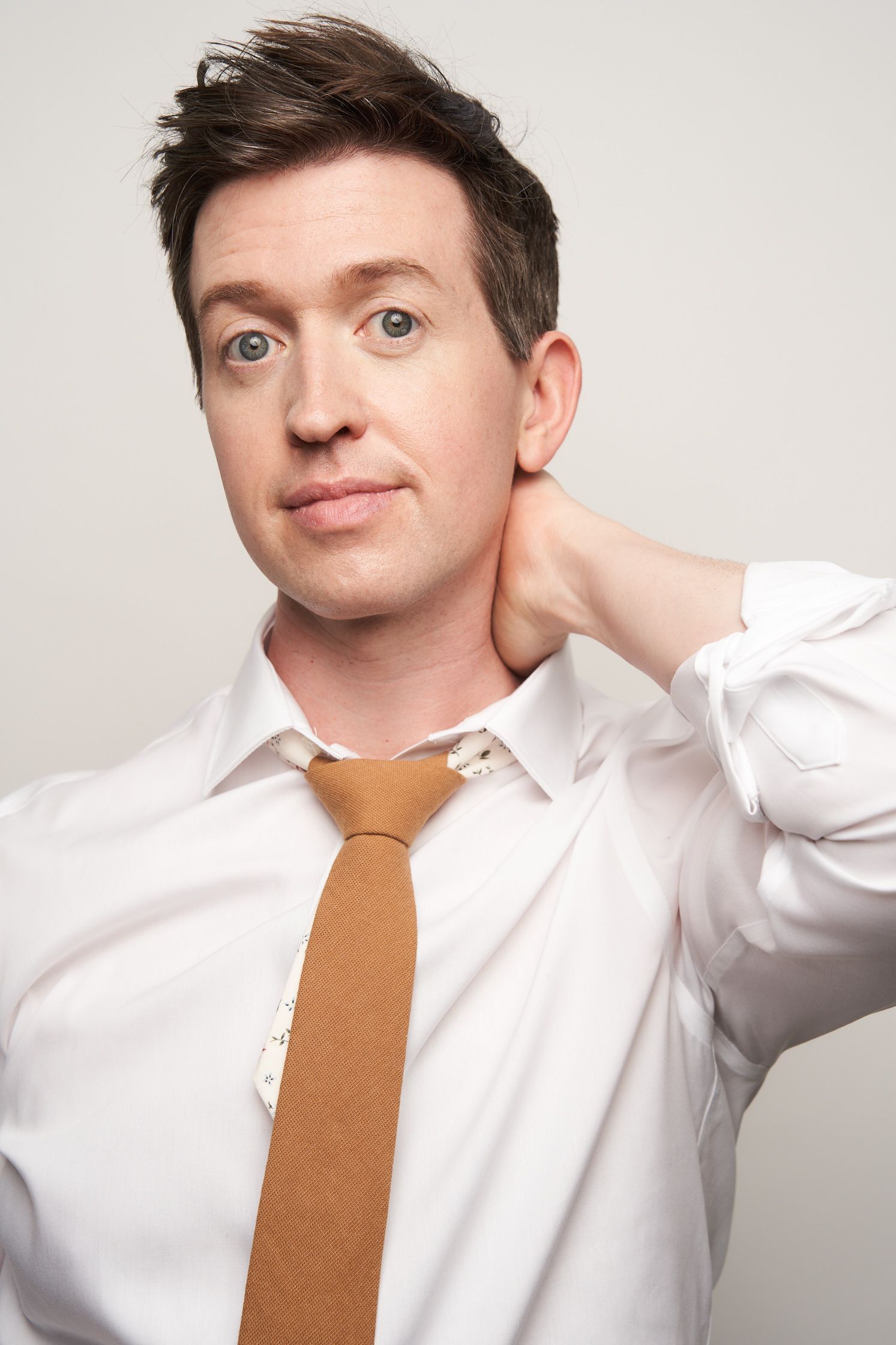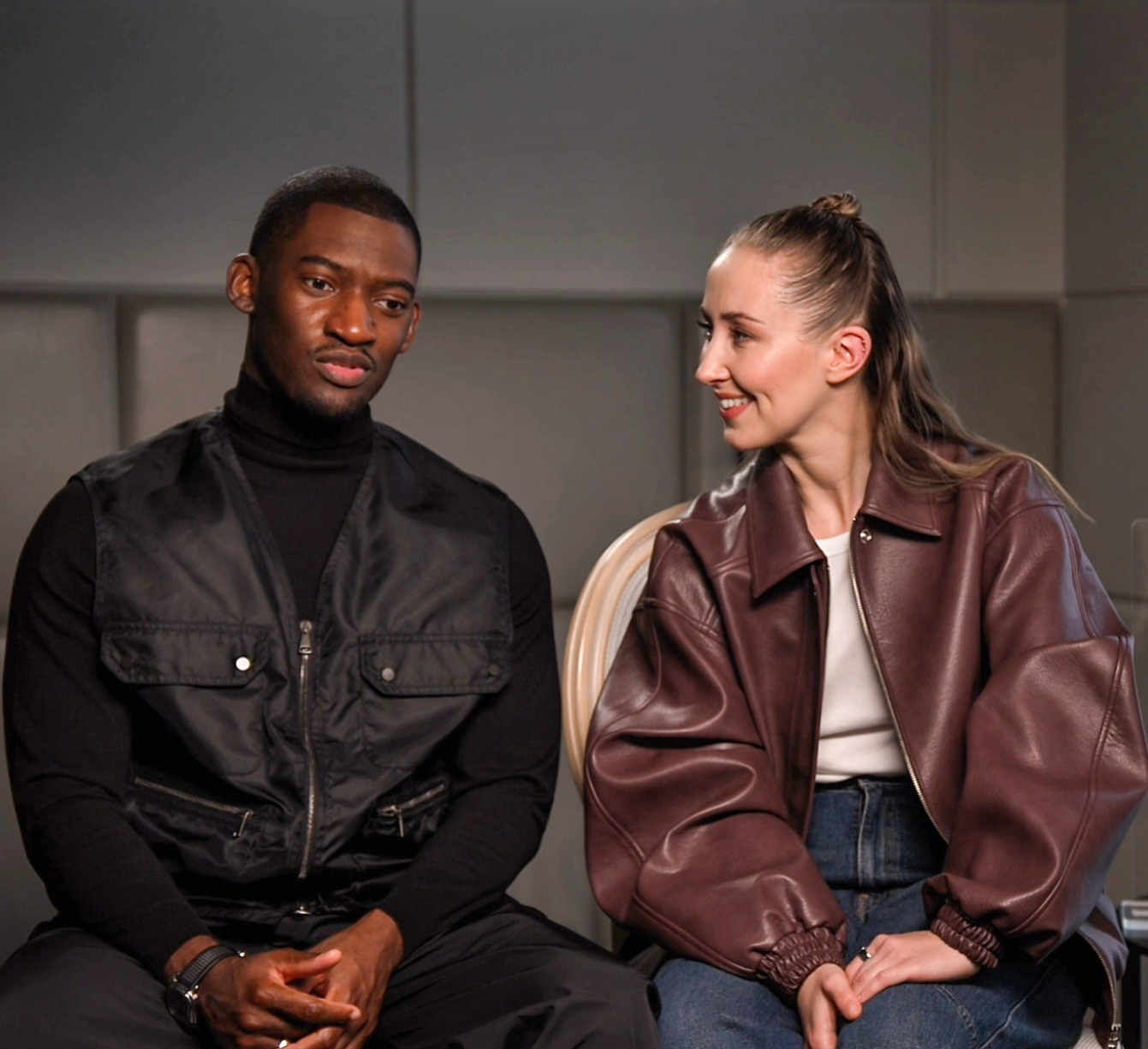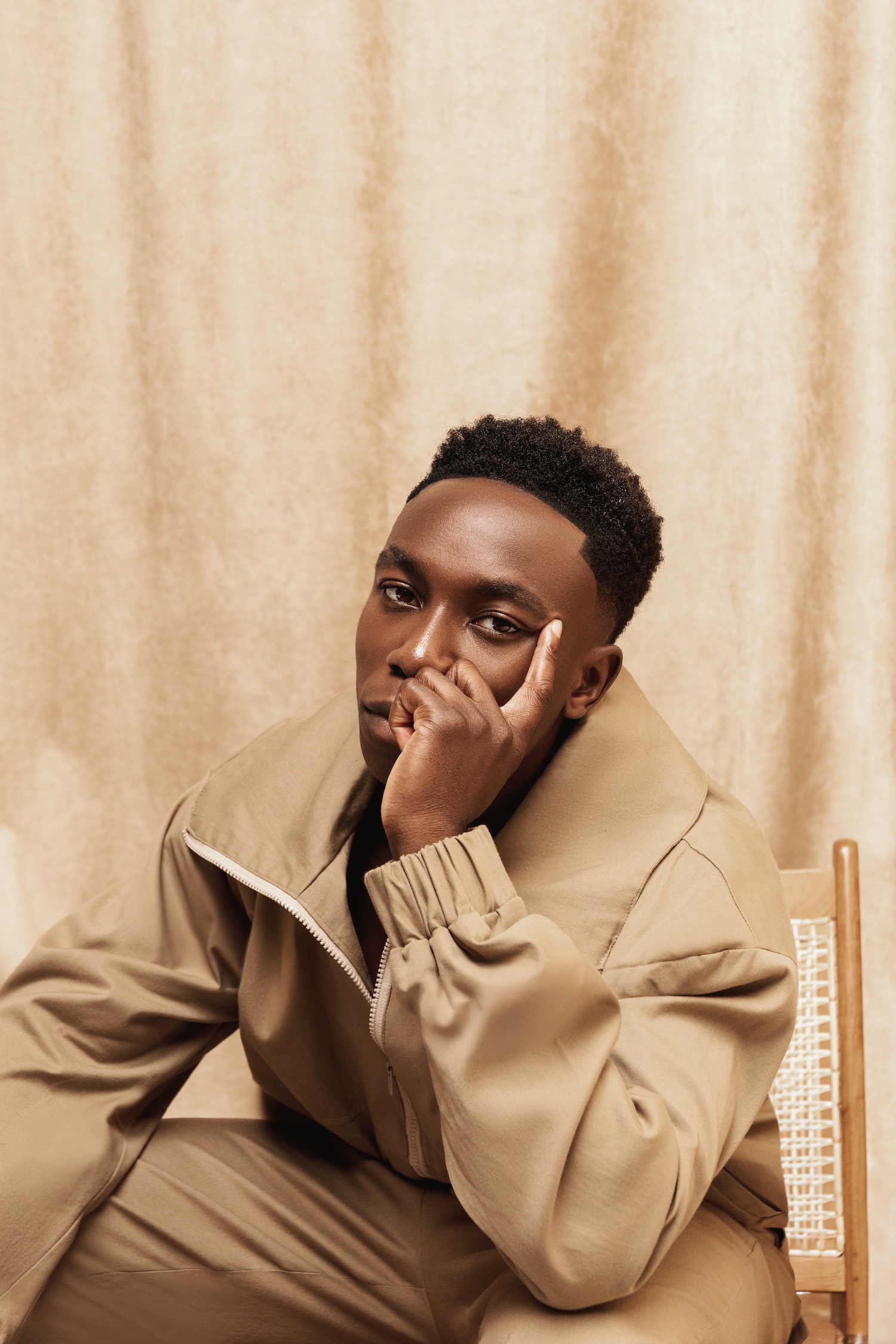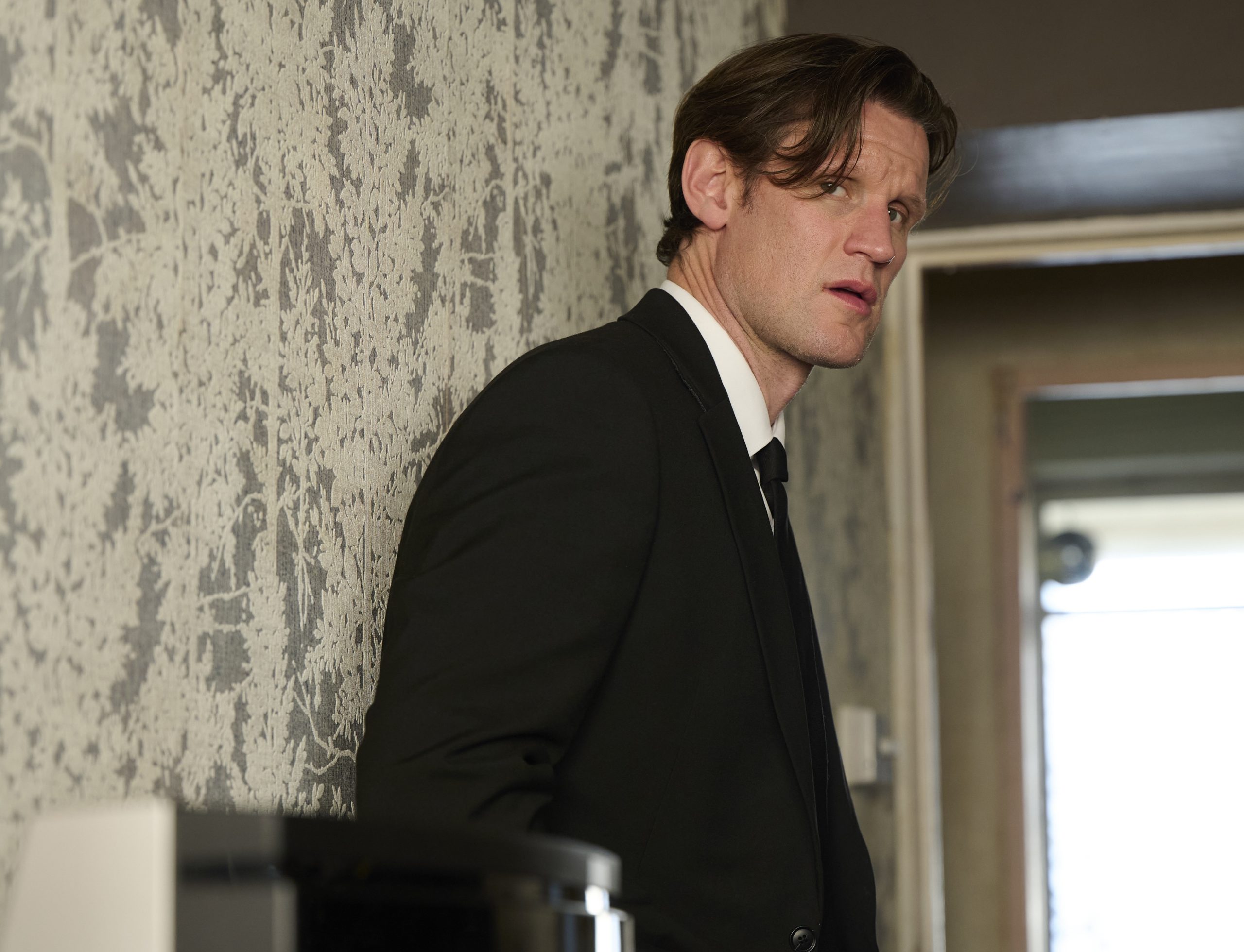With a razor-sharp wit and lightning-quick improv reflexes, Jon Matteson has made a name for himself.
Across the likes of Smosh, Dropout, and StarKid, so much more, Matteson is quickly becoming a sought-after talent. When we sit down with him, we’re met with a warm smile and an eagerness to talk shop. As online game shows and theatre start to become more mainstream, Matteson finds himself in the unique position to watch the medium grow from its genesis. With no signs of it stopping and continuing to evolve, it’s not a surprise that he is flourishing.
Stepping back into his award-winning role as Paul Matthews, in The Guy Who Didn’t Like Musicals, it felt like home. He revels in the knowledge that being asked back is such a privilege. From one revelation to the next, he takes us on a journey through his very non-linear career. Building himself up to be a powerhouse actor in his own right.
Now, with his latest venture, Matteson is pushing the creative envelope. Co-creating the live horror actual-play: We’re All Gonna Die: A DREAD Actual Play Experience, he is blending mediums, from comedy to music, and horror, all in an effort to make some unique and grotesquely awesome.
In conversation with 1883’s Dana Reboe, Jon Matteson discusses We’re All Gonna Die, what a non-linear career looks like, what he loves about improv versus a scripted format, and so much more.
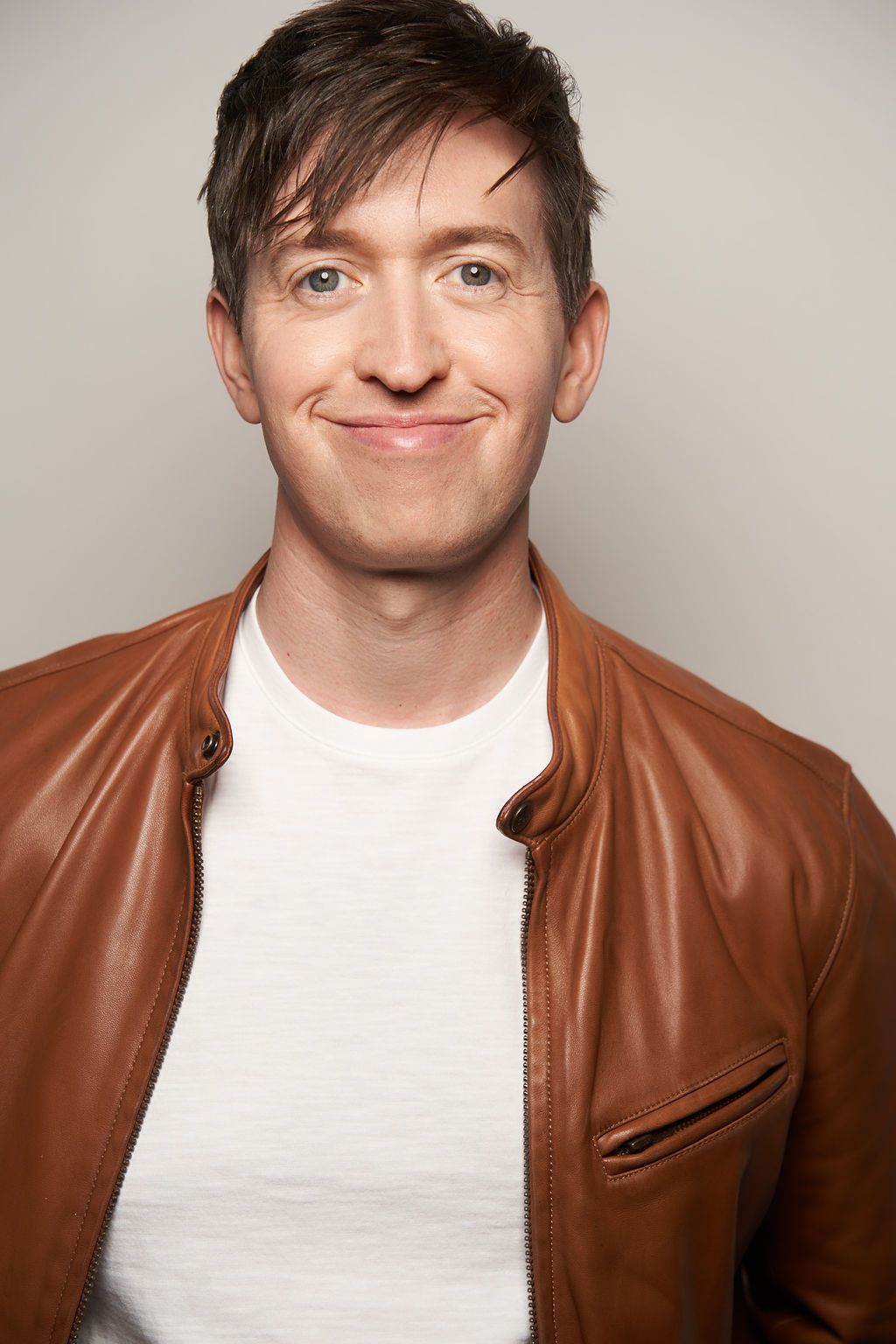
To start us off, one of my favorite things to ask actors is why they do what they do. So, what is it about acting that you love so much? What were the films and performances that inspired you?
That’s such a fantastic question. I think what pulls me to acting and especially performing live on stage is the feeling I get when I’m connecting with other performers in a show where things feel real and improvised, even within the boundaries of the script or the world that we’ve built together. That’s a pleasure to be able to do that. And what performances really inspired me, I really loved Gene Wilder and everything he did.
He was always very open and vulnerable, and sincere. And at the same time, very passionate and intense, but it never felt over the top or forced. Additionally, Jimmy Stewart, an older choice, but again, everything he did, especially for his generation was very real and sincere and at the same time, very funny.
Are there particular performances from Gene Wilder or Jimmy Stewart that come to mind?
Yes, I think comedy-wise, Gene Wilder in The Producers or Young Frankenstein.
That’s a great one, “My grandfather’s work was doodoo!” [laughter]
I even love his older movies, See No Evil, Hear No Evil. I think I’m getting that title wrong. And of course, Willy Wonka and the Chocolate Factory. I love all of those performances.
And for Jimmy Stewart, it’s cliché for a reason, but I love him in It’s a Wonderful Life, Rear Window, and Philadelphia Story.
Rear Window is a special one for me. I’m not sure why.
It’s one of those movies where the set and the world feel so handmade and crafted. It feels like a play while still feeling very cinematic and alive. I love the world of Rear Window and everything he sees.
I never thought of it like that. Moving forward, you’re Second City alum, and you’ve done long-form improv.Can you talk about the challenges and the differences between that and scripted work?
I love long-form improv because I love getting the chance to perform with a group and build on top of something with a group. But I also love short form because I love getting to play within the boundaries of this game we’ve built. I think both have merit, but I really love long form. And it gives me and whoever I’m playing with the ability to be weird and do more avant-garde moves. And everything always feels like it comes from a very supportive place.
And I love it more as an actor, because what I like to do before a long form show is that I will give myself a challenge as a performer, whether that’s like, “What is one thing that I can focus on or accomplish when I’m doing a long form show?” Whether that’s an intention or a character I’ve been working on, or if that’s focusing on the eyes of the performers that I’m playing with, or trying to identify what they’re feeling in a scene and mirror that, or call that out. I really love doing that in long form.
There must be some vulnerability there with you and your scene partner, because you are each other’s safety nets.Can you talk about what it was like to step back into the role of Paul Matthews for The Guy Who Didn’t Like Musicals? Can you also touch upon the first goal of the Kickstarter being funded in five hours? Because that’s insane.
It’s been a wild five months. So much has happened. And we just closed the show. And although who knows what’s going to happen with the show next, I don’t want to ‘Tom Holland’ myself. But… [laughs]
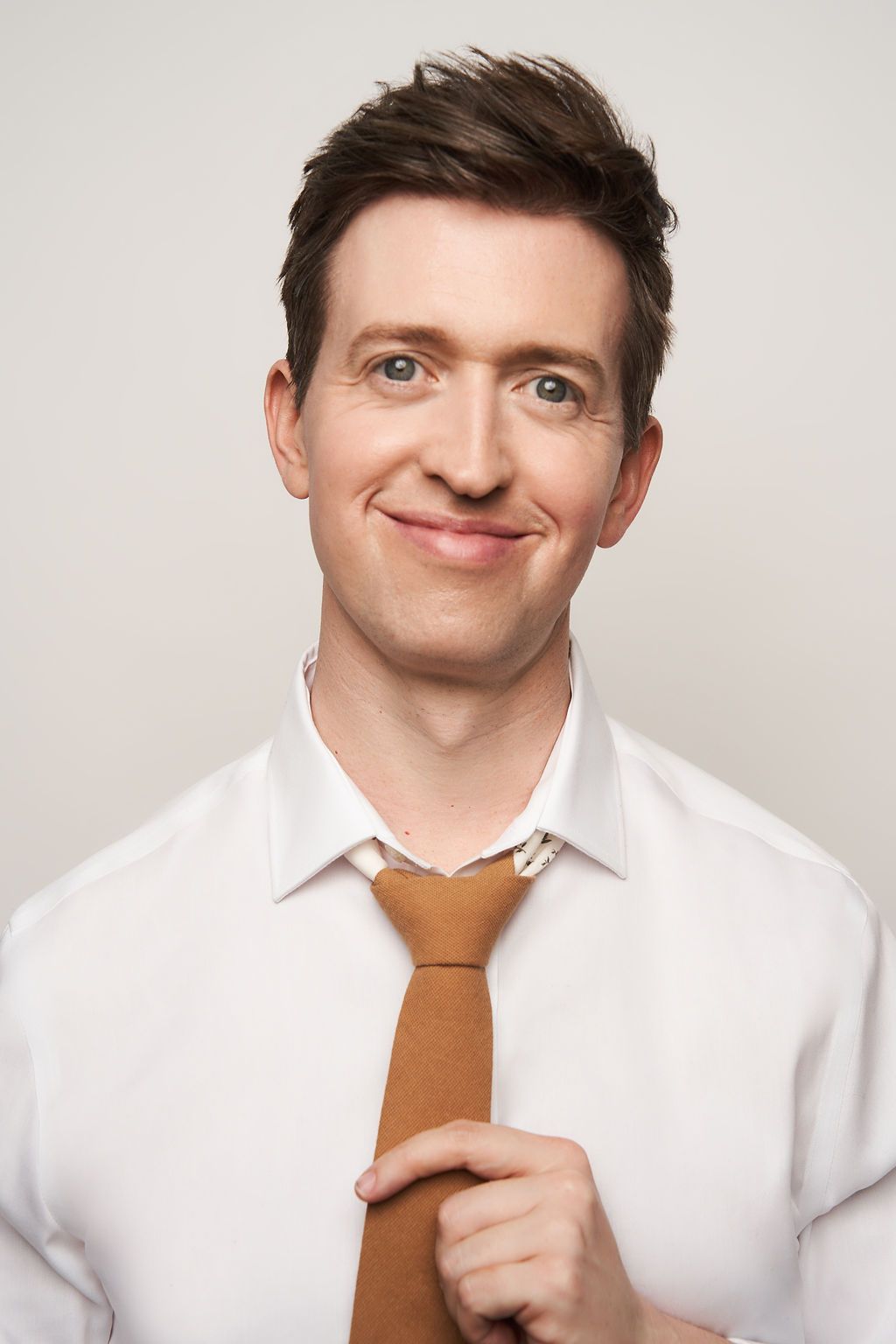
I’d love that, please, continue.
I’m sure you would [laughter], but when getting the chance to step into a role that – it was the first role I played with StarKid, it was transformative for me and my career.
And then a year after that show ended, the pandemic happened. And StarKid started doing way more digital performances. But even in those Zoom performances, we had done more shows investigating the world of Hatchetfield, where Paul Matthews and The Guy Who Didn’t Like Musicals takes place.
We had been doing six years of dramaturgy on the world of Hatchetfield and this character. So, getting the opportunity to play Paul Matthews again is something that actors hardly ever get the chance to do. It’s like getting the opportunity to play Hamlet and then studying Shakespeare and I guess in this analogy, studying Denmark and watching all other Hamlet performances and then getting a chance to dive back into Hamlet again eight years later.
It hardly ever happens, and I am extremely grateful that I got this opportunity and I can’t wait to see what people think about this new reprised performance. And then to answer your second question, the whole cast was shocked that we raised over $350,000. It just reminded all of us that there are so many people out there who want to see more of Hatchetfield and want to see more of these characters.
And it allowed all of us to dive back into the project with a lot of joy and gratitude knowing that we have an army of people who love this show and love this world and want to see it again.
It’s incredible, because in my research, I did a deep dive on TikTok and just all of the fan support, the fan videos. People love the world, the show and the music so much. The fan base is strong. Moving to Dropout, can you talk a little bit about working on unscripted formats like Game Changer, Dirty Laundry and Smarty Pants? What do you think makes them click with fans? And what makes, why do you keep coming back to those formats?
I keep coming back to those formats because I absolutely love working with Dropout.
I remember being on set the first time for Smarty Pants, and everybody on set, every single crew member, was clearly excited to be there. I remember they ended the shoot day with colored lights and a dance party. Everyone was treated so well, with so much respect and love and you can see it in everybody. I love doing unscripted work because I came up through Second City and iO and The Annoyance in Chicago fo 10 years before I came to LA.
But it was funny while I was in Chicago, around my improv friends, I was always the ‘actor’ around all of my actor friends, because I had a small theater company out there. I was the improv guy. I always felt pulled between those two worlds, even though they’re the same.
And what I love about LA is I think a lot of those worlds blend together. Including Dropout, because yeah, I love those unscripted formats.
I’d love to do Make Some Noise or Game Changer again. They do a fantastic job of bringing together people who are not only incredibly good at unscripted formats, but are also the most charming people you’ve ever met or seen, and are very vulnerable and generous with their energy. So yeah, it feels good to be around them.
It definitely translates to the viewers because it feels like such a safe space. And speaking of safe spaces, I saw a TikTok where you were giving advice to someone going on their first audition. You told them to get out of their own head.How do you get out of your own head when it comes to auditions and performing?
That’s such a great question. I try to get out of my own head, first by setting myself up for success. If it’s for an improv show, I try to get a couple of days of really good sleep, if possible, and have a lot of energy so that I’m not tired or stretched.
For a play or a musical, I try to get off-book as soon as possible. The sooner you get off book, the more you can play and make your own decisions and allow your brain to make those neural connections, the ones that you really can’t force it to make, but you can only make after immersing yourself in the script. When I was starting out acting, I was putting a lot of pressure on myself.
And I think a lot of young people put a lot of pressure on themselves because I think, in the world of the internet, we’re afraid of everything looking perfect and living on the internet forever. And the best way to ground yourself and get out of your head is to get into your body somehow, whether that’s yoga or stretching or going for a run or dancing, whatever format that works for people. I think getting out of your sort of mental prison that we put around ourselves with expectations and stress and our vivid imaginations, putting together a thousand different permutations of what, how it could work out rather than just dealing with what’s in front of you. I think that’s the best way to approach performing. Because if you overthink, you’re not in tune with everything else that’s going on.
I’m just going to write down all of that.
Well, lucky for you, it’s recorded [laughs].
Can you describe to me the first time that you recall going off-book and what that felt like?
I was in college. I had a very small role in a show. And it was in Guys and Dolls. And this is, I think in retrospect, a very selfish thing to do. But I was 19. But I remember it was this very, very small role. I was playing the drunk in the show. The cast was very, very, very close knit and tight. And the drunk has one line and his line is just, “What vulgar jewelry.” And then he wanders off stage. That’s the line, which means nothing.
The director was like, “Hey, I was thinking about either cutting the line or you could be like an upscale foppish character.” And I said, “Okay, I’ll do that.” I don’t know why I had the moxie to ask for this.
I was like, “Fine, I’ll do it. But I want little glasses, a mustache, a giant cape, and a cane.” And so I got all this stuff. And every time I would come out, I would do the line completely different. And everyone, all the crew and cast off stage would be waiting for me to see what I would do and be screaming at the top of their lungs off stage waiting for me to say it.
I love that so much. Moving to We’re All Gonna Die, which you co-created. What was the process behind that?
I met George Primavera during the pandemic. I was like, “I need to perform and create with this guy because he is one of the most talented DMs I’ve ever worked with.” He’s an incredible storyteller and incredible actor, performer, and also does so much work and research on the world that he’s building. He is the real deal. And recently, he and I had been talking a lot. And it was actually his wife, Jess, who at dinner was like, “You two should work together.”
And so we just started scheduling these meetings. At first, they were writers’ meetings. He was working on a novel, and I was working on some character, like solo characters for camera. And then he came to me one day was like, “I want to do a show with Dread,” which I’ve been doing with Smosh. And I was like, “I’ve got a connection at Dynasty (Typewriter). Let’s go to Dynasty.” So, I reached out to Dynasty. Dynasty was very enthusiastic right away. They had known me through my work with Starkid.
Dynasty was the perfect venue for this type of show, because they and their team know how to combine live performance with cinema, essentially. And being able to put together from shot to shot when someone is maybe about to die versus when an NPC comes in covered in blood back to the Jenga Tower, which if it falls, that character is dead, creates like this adrenaline rush for the live audience watching and the people watching at home.
So, George and I got together, did the show. We invited more people from Smosh. And we met with Ali Cantonese, the CEO of Smosh. We met together as a group. And we really felt like partnering with Smosh going forward would accelerate this show, because their cast is also, they’re all incredible performers and incredible and know the format of Dread already. So, it’s one of the most exciting projects I’ve worked on in a while. And I’m so thrilled that we’re going to be doing a lot more of these shows.
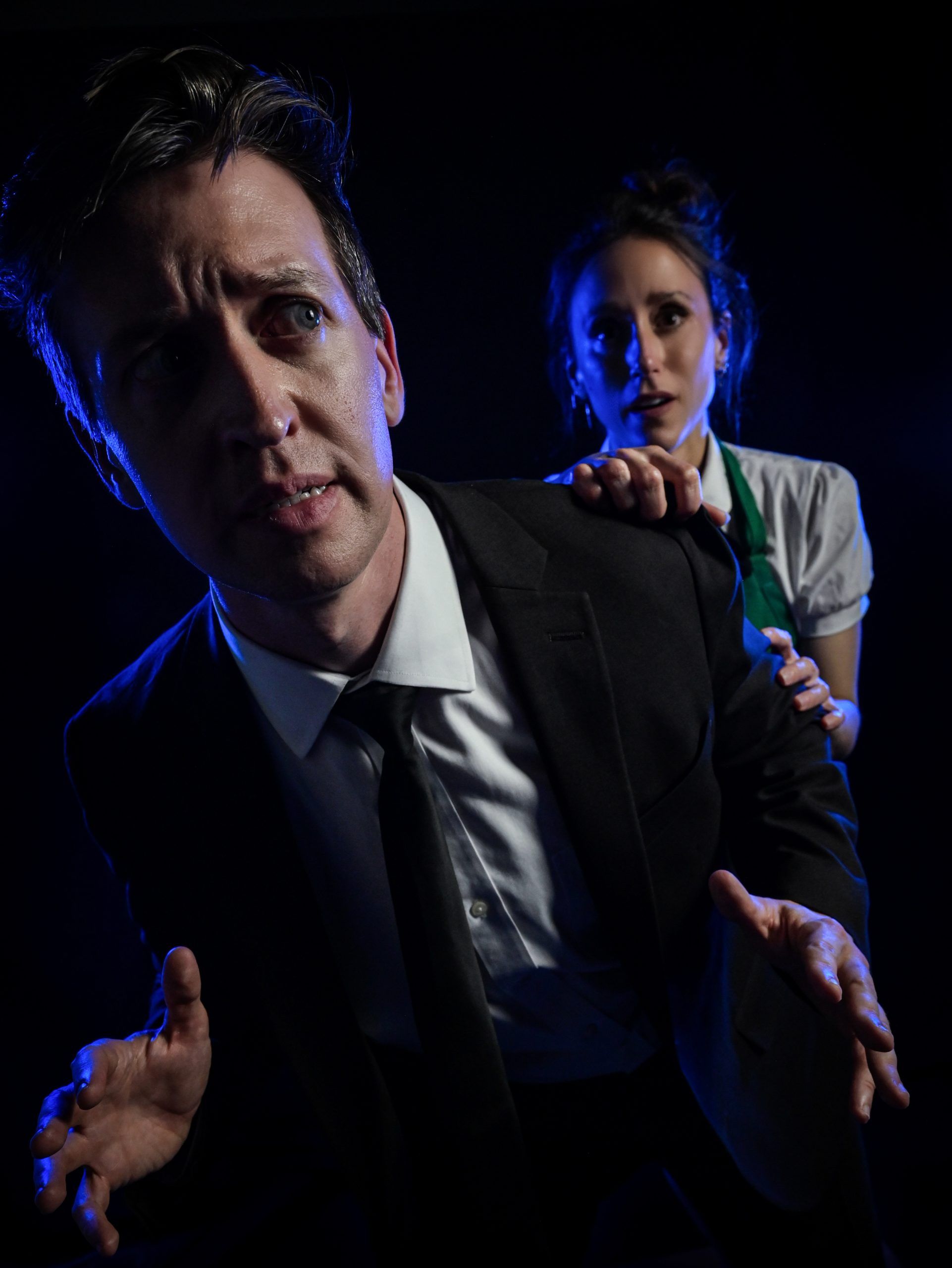
What has it been like to step into the role of producer for this?
It feels a lot more natural than I thought it would ever be. I think when you care deeply enough about a show and you know all of the inner workings of a show so well it feels very easy to just make sure all these connections happen quickly. And even though it falls on you as producer to make those things happen, when you spend, you know, 10 to 12 hours a week thinking about this show and what the next five shows are going to look like, and what the arc of this horror anthology is going to feel like, it feels like things just naturally fall into place. So, I love it. I get to see the thing I love blossom and be successful. So that’s just as fulfilling as performing it for me.
And it must be crazy to see like the reception to it too. Your baby is flourishing and flying, seeing the audience reception must be crazy.
It was after the first show that I was like, “Oh shit, we have a hit!” When the audience sometimes sees TTRPG live shows, it’s hard to know what the stakes are without doing all of the math. And when you know that all of the stakes are just based on this Jenga tower and you see it wobbling and you see these players desperately trying to get the blocks where they need to be in 30 or 60 seconds, then it feels like a sports event. It feels just like a fun roller coaster. And I can’t wait for more people to realize that and talk about this show because it’s, it’s a really exciting one to be there live or to see it live.
From Chicago to LA, how would you describe your journey? And what have you learned about yourself in this wild path that you’ve found yourself on?
I would say my journey has been very unconventional and very handmade. The industry has gone through massive peaks and valleys in the past 10 years. And when I mean the industry, I mean like the film and television and voiceover industry, which is what I was hoping and expecting to get immersed in when I transferred from Chicago to LA.
But I think instead what I happily landed in was this really exciting, different internet live theater companies. Whether it’s StarKid or Tin Can Brothers or Smosh or Dropout, which feels like the next stage, it feels like these companies and the way we consume media is moving in that direction anyway.
And I feel really lucky that I’ve landed in this world. I only worked with StarKid because I had been doing a musical in Chicago with my friends, Jeff Blim and Lauren Lopez, and they were going to see an SNL showcase that I was in that Meredith and Brian were in, and Nick Lang, who owned the company, was at that showcase. And he saw me do those. I didn’t end up on SNL, but he saw me do those characters and asked me to audition for The Guy Who Didn’t Like Musicals. And I’m really so happy he did.
As a creative, what advice would you give someone who is looking to get into entertainment?
I would say, if you’re just starting out, never say no to an opportunity, no matter how small that opportunity is. At the same time, balance your time and your life. Sorry, balance your life and time between work, and don’t over, don’t stretch yourself too thin. If you’re young, or even if you’re not young, if you’re just getting started, travel and experience more of the world. When I was just getting, when I was just leaving college, I was very focused on results. Like I was desperate to go to grad school and desperate to get to, to meet all the right people to get the job. And I remember professors back then were telling me, “Hey, just go travel and see the world and get some life experience.”
And I scoffed at that because I was like, “Fuck you, I want the job.” [laughter] And I understand now, what that means is that, no matter how you think your life is going to go, it never ends up going in a straight line. You have to enjoy the ride, and find the things that light you on fire, and let that lead you, find those things that inspire you.
And my last question, how would you say being an actor has changed you?
I would say being an actor has made me resilient, made me comfortable with change, and also made me a better friend and partner to the woman I love. And simultaneously, my friendships and partnerships. Believe it or not, growing in your personal life helps you in the world of acting, it helps you with listening, and you’re open to not staying in one place emotionally and physically. But I would say the top two things are not to be rigid in life, to be comfortable with change, and to be able to survive anything. This industry is unpredictable and inconsistent, but when you do get the chance to perform, it all feels worth it.
Interview Dana Reboe

